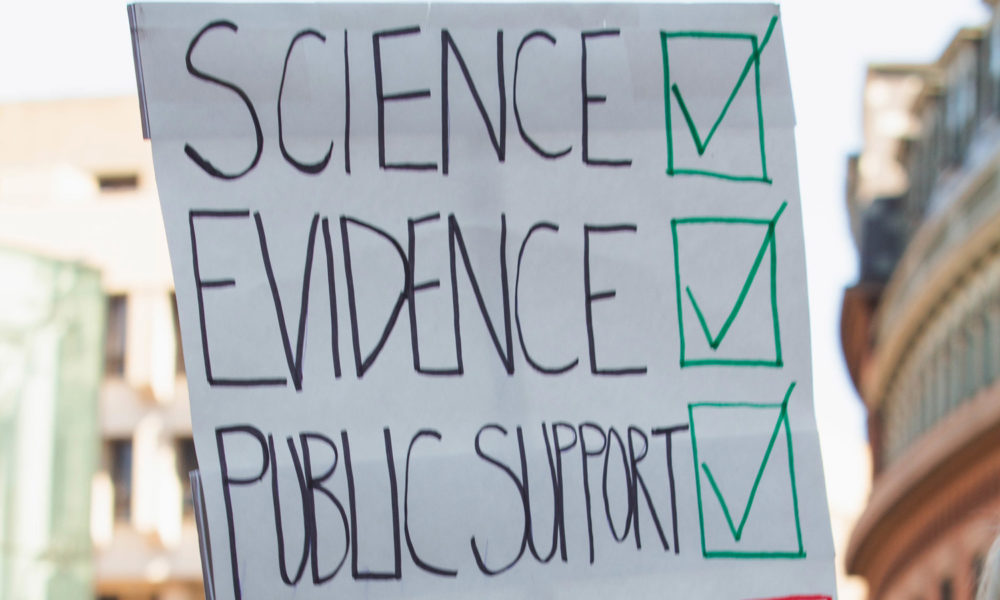This post originally appeared in Scientific American and was co-authored with Taryn MacKinney, Genna Reed, Gretchen Goldman, Anita Desikan, Casey Kalman, and Andrew Rosenberg.
Hours after he won the 2020 presidential race, then-President-elect Joe Biden delivered his victory speech to a crowd of masked supporters in Wilmington, Del. “What is the will of the people?” he asked. “To marshal the forces of science and the forces of hope in the great battles of our time.”
Today, as we near Biden’s 100th day in office, the Union of Concerned Scientists reflects on his administration’s progress toward “[marshaling] the forces of science.” This was and is no easy task, not least because of the previous administration’s assaults on federal science. During the Trump administration, UCS documented nearly 200 instances of political interference in science-based decisions—and as new investigations become public, this number keeps growing. These attacks have real consequences, none so clear as the 565,000 lives lost in the US to the COVID-19 pandemic, a crisis fueled by the Trump administration’s abandonment of science.
But on the edge of 100 days, the Biden administration has already made great strides in building back and strengthening science. Even before inauguration, President Biden took the unprecedented step of elevating his science adviser to the Cabinet level, a move we’ve supported for more than a decade—and a sign that he intends not only to listen to scientists but to let them lead. And on January 27, the president issued a memorandum on scientific integrity, making clear that his administration would not tolerate political manipulation of scientific evidence. The memo also directed science agencies to strengthen evidence-based decision-making and appoint chief science officers and scientific integrity officers, experts who oversee and enforce scientific integrity policies and practices.
Progress in COVID-19, climate change, and more
Biden has centered science in his administration’s fight against COVID-19. After he won the election, President-elect Biden formed a team of scientific experts to guide his administration’s strategy to end the pandemic. The administration also formed a COVID-19 health equity task force to address disparities in infections, deaths, and vaccine access. When the administration easily reached its goal to get 100 million vaccines in people’s arms in 100 days, it set and reached a new goal: 200 million vaccines in 100 days.
Climate scientists and their work are welcome at the White House once again. On Inauguration Day, President Biden committed to rejoining the Paris climate agreement, created a national climate adviser position in the White House, revoked the Keystone XL pipeline’s federal permit, and raised the social cost of carbon. Secretary of the Interior Deb Haaland soon revoked Trump-era orders that promoted fossil fuel development on public lands and waters, and Biden paused oil and gas leasing on public lands. The administration has also promised to place aggressive limits on methane pollution, reduce greenhouse gas emissions from the transportation sector, and require public companies to disclose climate risks. This work is already underway.
The Biden administration has also prioritized environmental justice. This is a much-needed shift; underserved communities tend to bear the brunt of the harms caused by anti-science policies like those of the Trump administration. The Biden administration’s American Jobs Plan and EPA budget direct billions of dollars toward environmental justice work and communities. The White House also formed two working groups on environmental justice, which will advise the administration on how best to protect the health and safety of underserved communities, and created a leadership position on environmental justice within the Council on Environmental Quality.
These efforts to restore federal science are encouraging. However, much remains to be done, and the Biden administration should seek advice from scientists, civil servants, government watchdogs, and other organizations on how to strengthen evidence-based decision-making and include a wider array of voices in the process. The administration must also learn from the past to protect federal science in the future.
The work that lies ahead
Many administrations have stumbled on the path toward scientific integrity. The Obama administration listened to politics over science in some cases, and dragged its feet on establishing scientific integrity policies across the federal government. The implementation of these policies proved even more difficult under Trump: senior-level political appointees often perpetrated the most egregious violations.
Today, one of the Biden administration’s new task forces has been asked to review scientific integrity policies. As it crafts recommendations, the task force should heed lessons from the Obama and Trump administrations, and seek input from outside the agencies.
The Biden administration is also directing agencies to review their science advisory committees, which gained many unqualified or conflicted members over the last four years. The administration should “reset” several of its advisory committees (that is, begin nominations anew from an empty slate), a process that EPA has already begun to undertake. But resetting committees doesn’t mean returning to the status quo. As directed by the Biden administration, agencies should ensure that science advisory committees are more diverse, drawing in scientists from a wider range of backgrounds, disciplines, institutions, and perspectives.
The administration must also restore science to government. Thousands of scientists were lost from key science-based agencies during the past four years, stripping the federal workforce of vital expertise. As agencies rebuild, they ought to seek out scientists and experts from groups that have been historically underrepresented in federal science, from universities and colleges outside the Beltway and the top tier of institutions, and from underserved communities. A review of internship programs is already underway, with a promise to hire younger professionals.
This is not an exhaustive list of successes or recommendations. The Biden administration has done more, and must do more, to protect scientists and their role in decision-making. But the scientific community cannot sit on the sidelines and assume that the Biden administration, or any future administration, will fix federal science. Scientists are the strongest advocates for science, as shown by their success in fighting anti-science actions over the past four years. This advocacy must continue.
We’ve seen what happens when scientists assume they can or should ignore politics—and we’ve seen the incredible things that are possible when the scientific community gets engaged in civic life. We can’t assume the facts will speak for themselves. Scientists and nonscientists alike—all of us who care about good policy and just outcomes—have a responsibility to make sure that our government’s decisions are based on evidence, and that science serves the public good.

